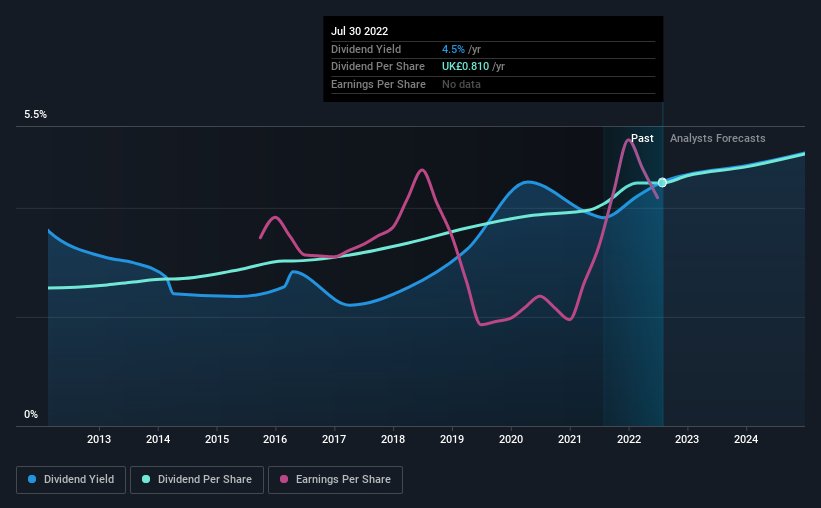- United Kingdom
- /
- Capital Markets
- /
- LSE:RAT
Rathbones Group (LON:RAT) Is Paying Out A Larger Dividend Than Last Year
The board of Rathbones Group Plc (LON:RAT) has announced that it will be increasing its dividend by 3.7% on the 4th of October to £0.28, up from last year's comparable payment of £0.27. This takes the dividend yield to 4.5%, which shareholders will be pleased with.
View our latest analysis for Rathbones Group
Rathbones Group's Payment Has Solid Earnings Coverage
We like to see robust dividend yields, but that doesn't matter if the payment isn't sustainable. Prior to this announcement, Rathbones Group's dividend made up quite a large proportion of earnings but only 12% of free cash flows. Since the dividend is just paying out cash to shareholders, we care more about the cash payout ratio from which we can see plenty is being left over for reinvestment in the business.
Over the next year, EPS is forecast to expand by 29.4%. If the dividend continues along recent trends, we estimate the payout ratio will be 63%, which would make us comfortable with the sustainability of the dividend, despite the levels currently being quite high.

Rathbones Group Has A Solid Track Record
Even over a long history of paying dividends, the company's distributions have been remarkably stable. Since 2012, the annual payment back then was £0.46, compared to the most recent full-year payment of £0.81. This works out to be a compound annual growth rate (CAGR) of approximately 5.8% a year over that time. Dividends have grown at a reasonable rate over this period, and without any major cuts in the payment over time, we think this is an attractive combination as it provides a nice boost to shareholder returns.
The Dividend's Growth Prospects Are Limited
Investors who have held shares in the company for the past few years will be happy with the dividend income they have received. Earnings have grown at around 4.6% a year for the past five years, which isn't massive but still better than seeing them shrink. Slow growth and a high payout ratio could mean that Rathbones Group has maxed out the amount that it has been able to pay to shareholders. When the rate of return on reinvestment opportunities falls below a certain minimum level, companies often elect to pay a larger dividend instead. This is why many mature companies often have larger dividend yields.
Our Thoughts On Rathbones Group's Dividend
In summary, while it's always good to see the dividend being raised, we don't think Rathbones Group's payments are rock solid. The company has been bring in plenty of cash to cover the dividend, but we don't necessarily think that makes it a great dividend stock. We would probably look elsewhere for an income investment.
Market movements attest to how highly valued a consistent dividend policy is compared to one which is more unpredictable. However, there are other things to consider for investors when analysing stock performance. For instance, we've picked out 1 warning sign for Rathbones Group that investors should take into consideration. Looking for more high-yielding dividend ideas? Try our collection of strong dividend payers.
New: AI Stock Screener & Alerts
Our new AI Stock Screener scans the market every day to uncover opportunities.
• Dividend Powerhouses (3%+ Yield)
• Undervalued Small Caps with Insider Buying
• High growth Tech and AI Companies
Or build your own from over 50 metrics.
Have feedback on this article? Concerned about the content? Get in touch with us directly. Alternatively, email editorial-team (at) simplywallst.com.
This article by Simply Wall St is general in nature. We provide commentary based on historical data and analyst forecasts only using an unbiased methodology and our articles are not intended to be financial advice. It does not constitute a recommendation to buy or sell any stock, and does not take account of your objectives, or your financial situation. We aim to bring you long-term focused analysis driven by fundamental data. Note that our analysis may not factor in the latest price-sensitive company announcements or qualitative material. Simply Wall St has no position in any stocks mentioned.
About LSE:RAT
Rathbones Group
Provides wealth management, asset management, and related services in the United Kingdom and Channel Islands.
Excellent balance sheet with moderate growth potential.
Similar Companies
Market Insights
Community Narratives



